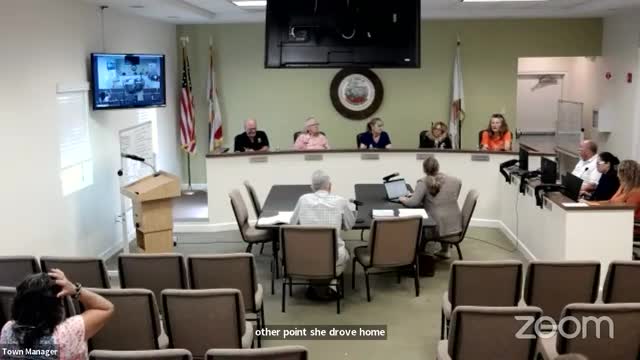Community debates RV regulations amid rising tensions
June 19, 2024 | Town of Loxahatchee Groves, Palm Beach County, Florida

This article was created by AI summarizing key points discussed. AI makes mistakes, so for full details and context, please refer to the video of the full meeting. Please report any errors so we can fix them. Report an error »

In a recent government meeting, local officials engaged in a heated discussion regarding regulations surrounding recreational vehicles (RVs) in residential areas. The debate was sparked by a resident's inquiry about the fairness of allowing an equestrian business to rent out multiple RVs while restricting individual homeowners from having similar arrangements.
The conversation highlighted the complexities of enforcing existing codes, particularly the difficulty in determining whether RVs are occupied or simply stored. Officials acknowledged the need for a more user-friendly approach to regulations, suggesting that simplifying the language and requirements could help foster compliance among residents.
Several council members expressed concerns about the potential increase in density and the implications for community resources. One member emphasized the importance of ensuring that RVs are properly maintained and that their occupants have access to safe utilities, such as clean water and adequate sewage disposal. The discussion also touched on the need for a balance between accommodating residents' desires for RVs and addressing the concerns of those who oppose increased RV presence in their neighborhoods.
A consensus began to form around a proposal that would allow homeowners with less than five acres to have two RVs, while those with five acres or more could have up to four. This proposal aims to create a clear and enforceable standard that would apply uniformly across the community, eliminating distinctions between stored and occupied RVs.
As the meeting progressed, officials recognized the necessity of combining existing ordinances into a single, coherent policy to streamline enforcement and registration processes. The goal is to ensure that all RVs are accounted for and meet safety standards, while also respecting the diverse needs of the community.
The discussions are ongoing, with officials committed to refining the proposed regulations to better serve both RV owners and those who prefer to limit their presence in residential areas. The outcome of these deliberations will significantly impact local zoning laws and the future landscape of the community.
The conversation highlighted the complexities of enforcing existing codes, particularly the difficulty in determining whether RVs are occupied or simply stored. Officials acknowledged the need for a more user-friendly approach to regulations, suggesting that simplifying the language and requirements could help foster compliance among residents.
Several council members expressed concerns about the potential increase in density and the implications for community resources. One member emphasized the importance of ensuring that RVs are properly maintained and that their occupants have access to safe utilities, such as clean water and adequate sewage disposal. The discussion also touched on the need for a balance between accommodating residents' desires for RVs and addressing the concerns of those who oppose increased RV presence in their neighborhoods.
A consensus began to form around a proposal that would allow homeowners with less than five acres to have two RVs, while those with five acres or more could have up to four. This proposal aims to create a clear and enforceable standard that would apply uniformly across the community, eliminating distinctions between stored and occupied RVs.
As the meeting progressed, officials recognized the necessity of combining existing ordinances into a single, coherent policy to streamline enforcement and registration processes. The goal is to ensure that all RVs are accounted for and meet safety standards, while also respecting the diverse needs of the community.
The discussions are ongoing, with officials committed to refining the proposed regulations to better serve both RV owners and those who prefer to limit their presence in residential areas. The outcome of these deliberations will significantly impact local zoning laws and the future landscape of the community.
View full meeting
This article is based on a recent meeting—watch the full video and explore the complete transcript for deeper insights into the discussion.
View full meeting